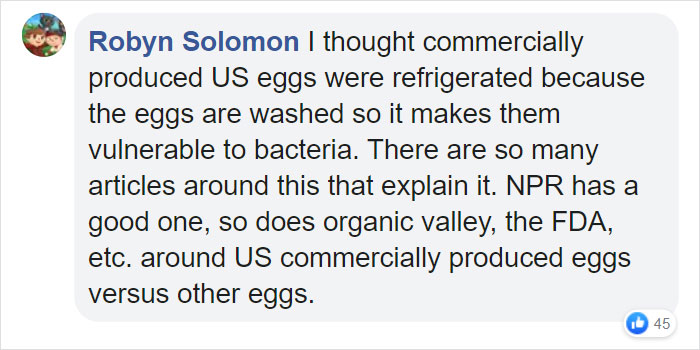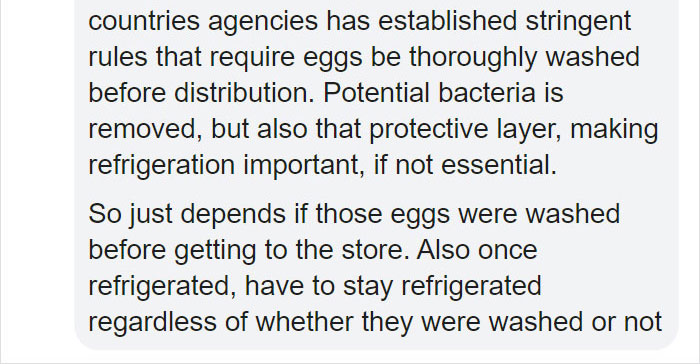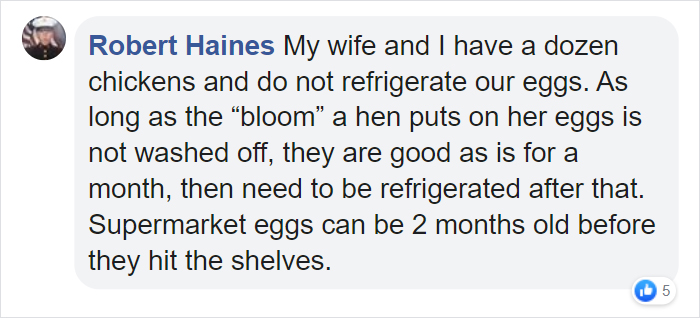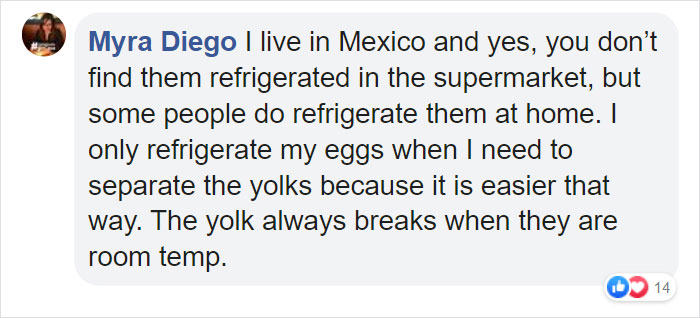
Americans Realize That Almost All Of The Rest Of The World Do Not Buy Refrigerated Eggs And A TikToker Explains Why
Eggs are so basic, they’re borderline boring, so we don’t really think about them a whole lot. Unless it’s a philosophical quest to find out which came first: the chicken or the egg. But that’s a different matter.
So when the TikToker Mauren Sparrow shared what seemed like a fun fact on eggs, it caused such a stir that people said their life was a lie. It all started with someone pointing out that many countries, unlike Americans, don’t refrigerate their eggs. And Mauren stepped in to explain why. Even if the US isn’t the only nation that stores eggs in supermarkets’ refrigerators, it turns out that the US Department of Agriculture recommends doing so.
The video went viral with 24.6K likes and almost 2K comments trying to make sense of how their lives are gonna go after this eggcellent bite of knowledge. Let’s see Mauren’s full explanation down below.
This Twitter user pointed out that Americans do refrigerate their eggs
Image credits: findingschmomo
Image credits: ToyaRochelle
Image credits: soonintheaters
This girl made a whole TikTok video explaining why Americans refrigerate eggs and you can watch it here
@maurensparrowOk, but did you know this ##funfact ? 🤔 . ##themoreyouknow##tiktokeducation##funfacts##eggucation##eggs♬ original sound – maurensparrow
Even if the US is not the only country that refrigerates eggs, Mauren gave an eggcellent explanation on why Americans do that
Bored Panda contacted Rafael Rivera, manager of food safety and production programs at the US Poultry & Egg Association, to find out what experts have to say about American and European ways of storing eggs.
Rafael explained: “When an egg is laid, it has a very thin membrane called the cuticle that prevents bacteria from passing through the pores on the shell.” Washing and brushing incorrectly leads to spoilage. “It can cause bacteria to enter the egg and either make the egg go bad or increase the risk of having salmonella.”
And at this point, there are two schools of storing eggs. “Europeans decided it was better to keep the eggs on the shelves without cleaning and brushing to protect the cuticle, even if the egg is dirty. Americans decided that it is better to clean the egg, because it looks better and refrigerating eggs prevents spoilage and contamination.” Either way prevents salmonella from passing through the shell, assured Rafael.
In terms of transmitting salmonella, it doesn’t seem that it makes much of a difference how you store eggs at home. “You need to cook the egg thoroughly before consuming it, and the rate of infection from eating undercooked or raw eggs is about the same regardless of whether it is refrigerated or not,” said Rafael. That being said, “refrigerated eggs can last for up to 50 days compared to the 20 days that an unrefrigerated egg might last.”
Many European supermarkets don’t refrigerate eggs. So it’s rather common to see stacks of egg carton boxes sitting in the aisles with long-lived foods like beans, pasta, and baking mixes. Meanwhile, eggs in the US sit in the refrigerated dairy section.
According toBusiness Insider, “the difference is linked to the way that eggs are farmed and processed in the US compared with in the UK and other European nations.” In the US, the Department of Agriculture requires supermarkets to wash and sanitize graded eggs before they’re sold. But EU egg marketing laws state the opposite. Forbesreports that European law “requires that Class A eggs—those found on supermarket shelves, must not be washed or cleaned in any way.”
Mark Williams, the chief executive at the British Egg Industry Council, told Forbes that “in Europe, such understanding of this mandate actually encourages husbandry on farms.” As a result, it’s in the farmers’ best interests then to produce the cleanest eggs possible since nobody is going to buy eggs that are dirty.
This is how people reacted
In other words - in most countries, they make sure their chickens are not infected with salmonella. In the US, we tolerate salmonella-infected chickens, and deal with it by washing the eggs and telling everyone not to eat raw eggs.
Exactly right. Yet a lot of people in the US enjoy eating raw cookie dough with, yep, raw eggs. Kills over 400 people a year and makes over a million sick.
Load More Replies...It's more to do with the farming conditions of the hens. Much like chlorinated chicken. Higher standards at the farm/slaughter house means less intervention on the customer's end product. There's very strict rules in the EU governing food.
The Brits have now begun trade talks with the US. It is most likely that the UK will have to accept the American much lower food safety standards for there to ever be an agreement, and with it they will also have to begin dealing with American bureaucracy. No laughing matter.
Load More Replies...The USA is disgusting with its food. Little to no regulation, poison everywhere, it’s disgusting. I’m happy to live in the EU.
Erin, I have never seen American beef ( or American meat of any kind) in Ireland. We produce some of the best beef in Europe and the world so the VAST majority of our meat is Irish
Load More Replies...In Romania the eggs are kept in a cooled area or in the fridges in stores and houses. Sometimes are kept in a dark and cold room (called beci or camara, usually this happen at the country side) when the eggs will be used in a short time.
UK. Not refrigerated. Fridges come with egg holders; NEVER seem them used.
Egg holders in fridges are a bad, bad idea - eggs should not be kept in the doors as the temperature is not kept consistent enough from opening/closing the door and the eggs get banged about and get teeny tiny cracks in them that can cause contamination from odours in the fridge.
Load More Replies...We refrigerate eggs in Greece, too. What I don't get is how sure she is of what she's saying. Did she do any research? Where does she base her statement on? Did she just want to say that Americans are unique or plain weird?
From my experience, Americans are really surprised when they see unrefrigerated eggs abroad. In American shops they are always displayed in fridges, never out in the open. And her research is right. They do this because the eggs are chemically cleaned, which removes the natural protective layer.
Load More Replies...From a country that doesn’t use egg cups this doesn’t surprise me. Lol just kidding but seriously, how do you do dippy eggs without egg cups?
I'm glad I'm not the only one who is concerned by the implication that US farmers don't give a flying [bleep] about the chickens that are literally responsible for making them money.
If you think the chicken conditions are bad, you don't want to know how the mass processors in the U$ handle beef and pork. Thankfully, we raise our own beef and poultry, and have a local source of pork who is a lifetime friend. The meat from the supermarket is so foul and rank that the smell when it cooks makes me nauseous.
Load More Replies...Sweden 🐔 Eggs are kept in room temperature in stores here. As far as I can see the eggs are clean too so I guess maybe EU regulations has farms kept cleaner and healthier here so the risk for salmonella is considered to be low or low enough? I don't know, I'm just guessing 🤷♀️ I do actually always put eggs in the fridge when I come home with them, which I never really thought about until now. That's weird that I do that... I wonder why I do that?
Hens are vaccinated against Salmonella in many countries thankfully. Eggs are fine to be kept in a fridge - just keep them in the box and not in any door rack as that's not good for the eggs. Inconsistent temperature and the regular jarring to the eggs causing micro cracks to the eggs shell - neither are good for eggs.
Load More Replies...It's terrifying how drastic the difference in food is between other countries and the U.S. Besides the types of chemicals/additives (whatever you want to call them, I literally forgot everything I learned in my environmental elective from three years ago), our food is just pure trash. "Healthy" food is expensive (emphasis on the quotations) and practically rare to find now-a-days. My dad had his stomach removed recently and we found out that he had sugar intolerance which essentially means he can't have more than 14 grams of sugar per meal (eight meals a day). Do you know... HOW F*CKING IMPOSSIBLE THAT IS HERE. There was one, ONE cereal that had 5 grams of sugar (I did the calculation to see the hidden sugars that they don't put on the box) and now they don't even sell it in stores. Everything is over 20 grams of sugar, 30, 40, 50, etc. etc. It is bloody ridiculous. We struggled to find meals for him for over two months before his intolerance finally went away.
Not only that but just comparing the food by consumption is the easiest way to show how different it is. I barely eat while I live here in the U.S. (I try to stick with three small healthy meals a day so I could try to lose weight). When I went to visit family in Poland, I ate three times more than I usually do and I lost over 10 pounds (4.5 kg, apologies for our ridiculous system). I had to buy new clothes in Poland because everything was falling off... If I eat that much in the States??? You're going to be seeing my a** rolling down Times Square, Indiana Jones Boulder Style.
Load More Replies...In Spain they sell all whole eggs on the shelves, not refrigerated, but my mom always put them in the fridge when we got home, so that's what I always do, too. I think refrigeration is good (especially in our warm climate) but it would mean extra expenses for supermarkets, so they don't do it. But it takes very little space and power to refrigerate my half dozen, so why not?
In Australia, some stores refrigerate their eggs, some don't. This doesn't depend on the type of the supermarket, rather than size. If the supermarket is large enough to store the eggs in the fridge, then they do. If it's a smaller sized supermarket, then the eggs go on shelves. Go figure..
Came to say this. All my local stores in Australia have eggs in the fridge section.
Load More Replies...The US is NOT the only country. In Canada uur eggs are also refrigerated. And sweating eggs doesn't mean salmonella. Eggs have to be at room temperature for baking.
Typical American who thinks they are the "only" ones in the "world" to do something. Canadian's also refrigerate egg, probably for the same reason.
Here in Ireland, eggs aren't refrigerated in the shops but my family puts them in the fridge at home
They last much longer in the fridge, esp if you put the blunt side up. Sallonella is so extremely rare here in Sweden, I dont think of that as a hazard for eggs.
In Sweden they aim to have a 'clean production line' that eliminates Salmonella and many countries vaccinate hens against Salmonella. It isn't 100% but the only way to kill Salmonella is to cook your food properly.
Load More Replies...I'm from Australia and I refrigerate my eggs and at the supermarket, you'll never find room-temperature eggs
Refrigerated eggs stay fresher longer. It's really not that complicated.
Last time I checked Canada is not in the USA... they are not the ONLY country that refrigerates their eggs. For health and safety reasons.
I always thought the different between a refrigerated egg and a counter top one was that countertop eggs indicated that someone in the house was a baker...refrigerated ones are not used in baking. Adding cold eggs into a cake batter is part of the reason why you get a hill or mound in the middle of the cake because the edges have baked before the middle has a chance to warm up and start baking.
The reason you add room temperature eggs is because cold eggs will harden the fat and cause the mixture to curdle. The mound is usually because the oven is too hot and, yes, causes the outside of the cake to cook too quickly.
Load More Replies...We do refrigerate them in Italy too, of all the weird thing americans do this is not one of them. We don't have the salmonella scare tho.
All refrigeration does is make the salmonella slow in growth. I remember reading in a previous food-related post on Bored Panda that some people thought that refrigerating eggs will kill salmonella but it doesn't. The only way to kill salmonella is to cook food thoroughly.
Load More Replies...Your comment is very beneficial for the future, you have written in a very beautiful way, you have an inspiration for the youth who come to your comment is really very beautiful, nowadays children do not know where they are wandering, no one can make a comment like you. The post is very different. VIP Girl Bhiwadi Gurugram Girl Number gurugram girl number gurugram dating IMT Manesar Girl low price Hyderabad Party Girl gurugram girl number College Girl Gurugram newly married Girls Bhiwadi
The cutest thing I ever read on a blog was a japanese lady wondering why a recipe said "make sure to use fresh eggs". The concept of old or rotten eggs had never crossed her mind because if she needed eggs for a meal, she just went over to the market and bought fresh eggs. No mass production, just a neighbor with hens selling fresh eggs. I wish I hadn't lost the bookmark for her blog while changing operating systems. If anybody recognizes that blog, please send me a link.
USA is not the only country that refrigerates eggs. We do in Canada as well.
Factory farming is more prevalent in the U.S. so a) Hens are kept in battery cages with 3-5 birds crammed into a space the size of a sheet of notebook paper, who never see the outdoors until they are sent to slaughter or b) the "free range" hens are still kept in warehouses of 100,000 or more, unable to spread their wings, still never seeing the outdoors till the day they are sent to slaughter. Some sheds may have a few cat-door type openings to small yard outside so if you can get through the crowds, you might make it outside or just fight to the death trying. The manufacturer then gets to charge more for the eggs and the buyer gets to pretend they were obtained "humanely". In either case a) all male chicks are "masticated" alive down a garbage disposal because they are "worthless" and b) the hens are kept highly stressed, walking atop the bodies of the sick and the dead, so close together it makes sense to assume all eggs have salmonella and store accordingly. Hence, refrigeration
I'm in the US. We keep our eggs in the counter and people think we're crazy. They last for about a month, we've been doing it for a few years and no one has ever gotten sick.
Rubbish, we don't have salmonella in Sweden and it's safe to eat raw eggs, but we do use to refrigerate our eggs because they stay fresh longer.
hhmmm.....yes and how does one touch eggs not cleaned especially covered in hen s**t 865595_jmm...00418c.gif 
this lady is wrong actually (The United States) is not the only country the other americans their twins the canadians who proudly follow in step with United states of America also refrigerate their eggs why, simply because its the american thing to do
Something the FDA doesn't talk about is that the washing of the eggs pushes the salmonella into the egg. So what was an healthy egg, before washing, is now contaminated.
Some of these comments from the U.K. have me perplexed. The U.K. had some serious issues with food borne illness for a long time. With respect to salmonella contamination it took regulations in the late 90's and early 00's to really get it under control. The U.K. got there act together a little quicker sure, but it's not like they've been on top of their game all along. The US will get there.
Interesting. In South Africa eggs are sold room temperature but I store them in the fridge at home, I figured maybe they last longer, like milk lol
Canadians refrigerate eggs, Im so used to it that i cant imagine not having them in the fridge
I have live and traveled to many countries and often the eggs are May more delicious than store bought eggs here.
I wonder if they need to be refrigerated or not in Japan or France.. In the US they need to be refrigerated. You can still refrigerate an egg that doesn't need to be.
Load More Replies...I don't refrigerate farm fresh eggs. I don't buy eggs from the store. I live near a giant commercial farm
If you are in the US it would make no difference to safety as none of your hens are vaccinated against Salmonella. In the UK you would be okay to leave eggs with the Lion symbol (Quality Code Of Practice health and hygiene safety mark) out of the fridge but any purchased from a local farm you might want to think twice about it - they might not vaccinate the hens. Though refrigeration only slows salmonella growth. You have to cook eggs or other foods thoroughly to properly kill it.
Load More Replies...We rub them with oil to make them last months, they stay fresh. We keep them room temp for a while and then refrigerate if/when we have space.
It's best to refrigirate eggs but you have to use them right away once you put oof them from fridge.. It's OK to leave them outside for a week or more if you bought them from open shelf not from market refrigerator.
Why would you want to keep your eggs for months!? Even weeks?! Why are you hoarding eggs? Eat your damn food, or buy less. I can see in countries where it's harder to come by fresh eggs and milk you may need to stock up when you can but in the U.K.? Why are you buying so many eggs that you worry about them spoiling before you eat them? That sounds more American than European. How dare you try to out-hoard us!?
That's an issue with your phone I'm guessing, not bp.
Load More Replies...It's about the way they are stored in shops, not how people store them at home.
Load More Replies...If you didn't mind why make the extra comment? There's not a scrap of logic to that. The lady doth protest too much methinks. As GFSTaylor says why don't you try educating yourself? Persisting in the same inaccurate statements doesn't do you any favours. A simple internet search provides a lot of facts about import and export of foods and certainly in the UK we aren't getting the huge range of things from the US that you think we are - again as GFSTaylor points out otherwise why are we looking at trade deals? So many of your additives or high levels of pesticides/hormones are simply not allowed in the EU or the UK and no-one in the UK wants that to change. Hence a lot of research going into what standards need to be agreed before it goes ahead. Do some research and get your facts right.
Load More Replies...In other words - in most countries, they make sure their chickens are not infected with salmonella. In the US, we tolerate salmonella-infected chickens, and deal with it by washing the eggs and telling everyone not to eat raw eggs.
Exactly right. Yet a lot of people in the US enjoy eating raw cookie dough with, yep, raw eggs. Kills over 400 people a year and makes over a million sick.
Load More Replies...It's more to do with the farming conditions of the hens. Much like chlorinated chicken. Higher standards at the farm/slaughter house means less intervention on the customer's end product. There's very strict rules in the EU governing food.
The Brits have now begun trade talks with the US. It is most likely that the UK will have to accept the American much lower food safety standards for there to ever be an agreement, and with it they will also have to begin dealing with American bureaucracy. No laughing matter.
Load More Replies...The USA is disgusting with its food. Little to no regulation, poison everywhere, it’s disgusting. I’m happy to live in the EU.
Erin, I have never seen American beef ( or American meat of any kind) in Ireland. We produce some of the best beef in Europe and the world so the VAST majority of our meat is Irish
Load More Replies...In Romania the eggs are kept in a cooled area or in the fridges in stores and houses. Sometimes are kept in a dark and cold room (called beci or camara, usually this happen at the country side) when the eggs will be used in a short time.
UK. Not refrigerated. Fridges come with egg holders; NEVER seem them used.
Egg holders in fridges are a bad, bad idea - eggs should not be kept in the doors as the temperature is not kept consistent enough from opening/closing the door and the eggs get banged about and get teeny tiny cracks in them that can cause contamination from odours in the fridge.
Load More Replies...We refrigerate eggs in Greece, too. What I don't get is how sure she is of what she's saying. Did she do any research? Where does she base her statement on? Did she just want to say that Americans are unique or plain weird?
From my experience, Americans are really surprised when they see unrefrigerated eggs abroad. In American shops they are always displayed in fridges, never out in the open. And her research is right. They do this because the eggs are chemically cleaned, which removes the natural protective layer.
Load More Replies...From a country that doesn’t use egg cups this doesn’t surprise me. Lol just kidding but seriously, how do you do dippy eggs without egg cups?
I'm glad I'm not the only one who is concerned by the implication that US farmers don't give a flying [bleep] about the chickens that are literally responsible for making them money.
If you think the chicken conditions are bad, you don't want to know how the mass processors in the U$ handle beef and pork. Thankfully, we raise our own beef and poultry, and have a local source of pork who is a lifetime friend. The meat from the supermarket is so foul and rank that the smell when it cooks makes me nauseous.
Load More Replies...Sweden 🐔 Eggs are kept in room temperature in stores here. As far as I can see the eggs are clean too so I guess maybe EU regulations has farms kept cleaner and healthier here so the risk for salmonella is considered to be low or low enough? I don't know, I'm just guessing 🤷♀️ I do actually always put eggs in the fridge when I come home with them, which I never really thought about until now. That's weird that I do that... I wonder why I do that?
Hens are vaccinated against Salmonella in many countries thankfully. Eggs are fine to be kept in a fridge - just keep them in the box and not in any door rack as that's not good for the eggs. Inconsistent temperature and the regular jarring to the eggs causing micro cracks to the eggs shell - neither are good for eggs.
Load More Replies...It's terrifying how drastic the difference in food is between other countries and the U.S. Besides the types of chemicals/additives (whatever you want to call them, I literally forgot everything I learned in my environmental elective from three years ago), our food is just pure trash. "Healthy" food is expensive (emphasis on the quotations) and practically rare to find now-a-days. My dad had his stomach removed recently and we found out that he had sugar intolerance which essentially means he can't have more than 14 grams of sugar per meal (eight meals a day). Do you know... HOW F*CKING IMPOSSIBLE THAT IS HERE. There was one, ONE cereal that had 5 grams of sugar (I did the calculation to see the hidden sugars that they don't put on the box) and now they don't even sell it in stores. Everything is over 20 grams of sugar, 30, 40, 50, etc. etc. It is bloody ridiculous. We struggled to find meals for him for over two months before his intolerance finally went away.
Not only that but just comparing the food by consumption is the easiest way to show how different it is. I barely eat while I live here in the U.S. (I try to stick with three small healthy meals a day so I could try to lose weight). When I went to visit family in Poland, I ate three times more than I usually do and I lost over 10 pounds (4.5 kg, apologies for our ridiculous system). I had to buy new clothes in Poland because everything was falling off... If I eat that much in the States??? You're going to be seeing my a** rolling down Times Square, Indiana Jones Boulder Style.
Load More Replies...In Spain they sell all whole eggs on the shelves, not refrigerated, but my mom always put them in the fridge when we got home, so that's what I always do, too. I think refrigeration is good (especially in our warm climate) but it would mean extra expenses for supermarkets, so they don't do it. But it takes very little space and power to refrigerate my half dozen, so why not?
In Australia, some stores refrigerate their eggs, some don't. This doesn't depend on the type of the supermarket, rather than size. If the supermarket is large enough to store the eggs in the fridge, then they do. If it's a smaller sized supermarket, then the eggs go on shelves. Go figure..
Came to say this. All my local stores in Australia have eggs in the fridge section.
Load More Replies...The US is NOT the only country. In Canada uur eggs are also refrigerated. And sweating eggs doesn't mean salmonella. Eggs have to be at room temperature for baking.
Typical American who thinks they are the "only" ones in the "world" to do something. Canadian's also refrigerate egg, probably for the same reason.
Here in Ireland, eggs aren't refrigerated in the shops but my family puts them in the fridge at home
They last much longer in the fridge, esp if you put the blunt side up. Sallonella is so extremely rare here in Sweden, I dont think of that as a hazard for eggs.
In Sweden they aim to have a 'clean production line' that eliminates Salmonella and many countries vaccinate hens against Salmonella. It isn't 100% but the only way to kill Salmonella is to cook your food properly.
Load More Replies...I'm from Australia and I refrigerate my eggs and at the supermarket, you'll never find room-temperature eggs
Refrigerated eggs stay fresher longer. It's really not that complicated.
Last time I checked Canada is not in the USA... they are not the ONLY country that refrigerates their eggs. For health and safety reasons.
I always thought the different between a refrigerated egg and a counter top one was that countertop eggs indicated that someone in the house was a baker...refrigerated ones are not used in baking. Adding cold eggs into a cake batter is part of the reason why you get a hill or mound in the middle of the cake because the edges have baked before the middle has a chance to warm up and start baking.
The reason you add room temperature eggs is because cold eggs will harden the fat and cause the mixture to curdle. The mound is usually because the oven is too hot and, yes, causes the outside of the cake to cook too quickly.
Load More Replies...We do refrigerate them in Italy too, of all the weird thing americans do this is not one of them. We don't have the salmonella scare tho.
All refrigeration does is make the salmonella slow in growth. I remember reading in a previous food-related post on Bored Panda that some people thought that refrigerating eggs will kill salmonella but it doesn't. The only way to kill salmonella is to cook food thoroughly.
Load More Replies...Your comment is very beneficial for the future, you have written in a very beautiful way, you have an inspiration for the youth who come to your comment is really very beautiful, nowadays children do not know where they are wandering, no one can make a comment like you. The post is very different. VIP Girl Bhiwadi Gurugram Girl Number gurugram girl number gurugram dating IMT Manesar Girl low price Hyderabad Party Girl gurugram girl number College Girl Gurugram newly married Girls Bhiwadi
The cutest thing I ever read on a blog was a japanese lady wondering why a recipe said "make sure to use fresh eggs". The concept of old or rotten eggs had never crossed her mind because if she needed eggs for a meal, she just went over to the market and bought fresh eggs. No mass production, just a neighbor with hens selling fresh eggs. I wish I hadn't lost the bookmark for her blog while changing operating systems. If anybody recognizes that blog, please send me a link.
USA is not the only country that refrigerates eggs. We do in Canada as well.
Factory farming is more prevalent in the U.S. so a) Hens are kept in battery cages with 3-5 birds crammed into a space the size of a sheet of notebook paper, who never see the outdoors until they are sent to slaughter or b) the "free range" hens are still kept in warehouses of 100,000 or more, unable to spread their wings, still never seeing the outdoors till the day they are sent to slaughter. Some sheds may have a few cat-door type openings to small yard outside so if you can get through the crowds, you might make it outside or just fight to the death trying. The manufacturer then gets to charge more for the eggs and the buyer gets to pretend they were obtained "humanely". In either case a) all male chicks are "masticated" alive down a garbage disposal because they are "worthless" and b) the hens are kept highly stressed, walking atop the bodies of the sick and the dead, so close together it makes sense to assume all eggs have salmonella and store accordingly. Hence, refrigeration
I'm in the US. We keep our eggs in the counter and people think we're crazy. They last for about a month, we've been doing it for a few years and no one has ever gotten sick.
Rubbish, we don't have salmonella in Sweden and it's safe to eat raw eggs, but we do use to refrigerate our eggs because they stay fresh longer.
hhmmm.....yes and how does one touch eggs not cleaned especially covered in hen s**t 865595_jmm...00418c.gif 
this lady is wrong actually (The United States) is not the only country the other americans their twins the canadians who proudly follow in step with United states of America also refrigerate their eggs why, simply because its the american thing to do
Something the FDA doesn't talk about is that the washing of the eggs pushes the salmonella into the egg. So what was an healthy egg, before washing, is now contaminated.
Some of these comments from the U.K. have me perplexed. The U.K. had some serious issues with food borne illness for a long time. With respect to salmonella contamination it took regulations in the late 90's and early 00's to really get it under control. The U.K. got there act together a little quicker sure, but it's not like they've been on top of their game all along. The US will get there.
Interesting. In South Africa eggs are sold room temperature but I store them in the fridge at home, I figured maybe they last longer, like milk lol
Canadians refrigerate eggs, Im so used to it that i cant imagine not having them in the fridge
I have live and traveled to many countries and often the eggs are May more delicious than store bought eggs here.
I wonder if they need to be refrigerated or not in Japan or France.. In the US they need to be refrigerated. You can still refrigerate an egg that doesn't need to be.
Load More Replies...I don't refrigerate farm fresh eggs. I don't buy eggs from the store. I live near a giant commercial farm
If you are in the US it would make no difference to safety as none of your hens are vaccinated against Salmonella. In the UK you would be okay to leave eggs with the Lion symbol (Quality Code Of Practice health and hygiene safety mark) out of the fridge but any purchased from a local farm you might want to think twice about it - they might not vaccinate the hens. Though refrigeration only slows salmonella growth. You have to cook eggs or other foods thoroughly to properly kill it.
Load More Replies...We rub them with oil to make them last months, they stay fresh. We keep them room temp for a while and then refrigerate if/when we have space.
It's best to refrigirate eggs but you have to use them right away once you put oof them from fridge.. It's OK to leave them outside for a week or more if you bought them from open shelf not from market refrigerator.
Why would you want to keep your eggs for months!? Even weeks?! Why are you hoarding eggs? Eat your damn food, or buy less. I can see in countries where it's harder to come by fresh eggs and milk you may need to stock up when you can but in the U.K.? Why are you buying so many eggs that you worry about them spoiling before you eat them? That sounds more American than European. How dare you try to out-hoard us!?
That's an issue with your phone I'm guessing, not bp.
Load More Replies...It's about the way they are stored in shops, not how people store them at home.
Load More Replies...If you didn't mind why make the extra comment? There's not a scrap of logic to that. The lady doth protest too much methinks. As GFSTaylor says why don't you try educating yourself? Persisting in the same inaccurate statements doesn't do you any favours. A simple internet search provides a lot of facts about import and export of foods and certainly in the UK we aren't getting the huge range of things from the US that you think we are - again as GFSTaylor points out otherwise why are we looking at trade deals? So many of your additives or high levels of pesticides/hormones are simply not allowed in the EU or the UK and no-one in the UK wants that to change. Hence a lot of research going into what standards need to be agreed before it goes ahead. Do some research and get your facts right.
Load More Replies...
 Dark Mode
Dark Mode 

 No fees, cancel anytime
No fees, cancel anytime 


































































85
172